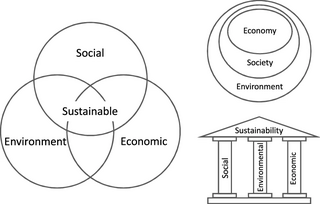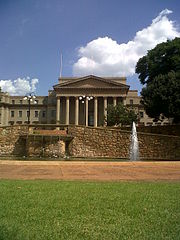Related Research Articles

The United Nations University (UNU) is the think tank and academic arm of the United Nations. Headquartered in Shibuya, Tokyo, Japan, with diplomatic status as a UN institution, its mission is to help resolve global issues related to human development and welfare through collaborative research and education.
Donella Hager "Dana" Meadows was an American environmental scientist, educator, and writer. She is best known as lead author of the books The Limits to Growth and Thinking In Systems: A Primer.
The Wuppertal Institute for Climate, Environment and Energy is a German research institution for sustainability research, focusing on impacts and practical application. It explores and develops models, strategies, and instruments to support sustainable development at local, national, and international levels. Research at the Wuppertal Institute focuses on ecology and its relation to economy and society. Special emphasis is put on analyzing and supporting technological and social innovations that decouple the prosperity of economic growth from the use of natural resources. The organization's activities focus on developing transformation processes aimed at shaping a climate-friendly and resource-efficient world.

The International Institute for Applied Systems Analysis (IIASA) is an independent International research institute located in Laxenburg, near Vienna in Austria, founded as an East-West scientific cooperation initiative during the Cold War. Through its research programs and initiatives, the institute conducts policy-oriented interdisciplinary research into issues too large or complex to be solved by a single country or academic discipline. These include climate change, energy security, population aging, and sustainable development. The results of IIASA research and the expertise of its researchers are made available to policymakers worldwide to help them make informed and evidence-based policies.

The United Nations Research Institute for Social Development (UNRISD) is "an autonomous research institute within the United Nations that undertakes multidisciplinary research and policy analysis on the social dimensions of contemporary development issues". UNRISD was established in 1963 with the mandate of conducting policy-relevant research on social development that is pertinent to the work of the United Nations Secretariat, regional commissions and specialized agencies, and national institutions.
The Earth Institute is a research institute at Columbia University created in 1995 for addressing complex issues facing the planet and its inhabitants, with a focus on sustainable development. With an interdisciplinary approach, this includes research in climate change, geology, global health, economics, management, agriculture, ecosystems, urbanization, energy, hazards, and water. The Earth Institute's activities are guided by the idea that science and technological tools that already exist could be applied to greatly improve conditions for the world's poor, while preserving the natural systems that support life on Earth.
The International Institute for Environment and Development (IIED) is an independent policy research institute whose stated mission is to "build a fairer, more sustainable world, using evidence, action and influence in partnership with others." Its director is Dr Tom Mitchell.
Robert W. Kates was an American geographer and independent scholar in Trenton, Maine, and University Professor (Emeritus) at Brown University.
The Brooks World Poverty Institute (BWPI) is a research centre at the University of Manchester dedicated to multidisciplinary research on poverty, inequality and growth. It was established in 2005 following the donation of £1.3 million to the university by the Rory and Elizabeth Brooks Foundation, one of the largest known gifts to fund poverty research in Europe. In September 2008, the Foundation awarded a further £1.4 million to the Brooks World Poverty Institute over three years and in June 2012, a further £1 million.

Sustainability is a social goal for people to co-exist on Earth over a long time. Definitions of this term are disputed and have varied with literature, context, and time. Sustainability usually has three dimensions : environmental, economic, and social. The popular three intersecting circles, or Venn diagram, representing sustainability first appeared in a 1987 article by the economist Edward Barbier. Many definitions emphasize the environmental dimension. This can include addressing key environmental problems, including climate change and biodiversity loss. The idea of sustainability can guide decisions at the global, national, organizational, and individual levels. A related concept is that of sustainable development, and the terms are often used to mean the same thing. UNESCO distinguishes the two like this: "Sustainability is often thought of as a long-term goal, while sustainable development refers to the many processes and pathways to achieve it."

The Potsdam Institute for Climate Impact Research is a German government-funded research institute addressing crucial scientific questions in the fields of global change, climate impacts, and sustainable development. Ranked among the top environmental think tanks worldwide, it is one of the leading research institutions and part of a global network of scientific and academic institutions working on questions of global environmental change. It is a member of the Leibniz Association, whose institutions perform research on subjects of high relevance to society.
Discovery Park is a 40-acre (160,000 m2) multidisciplinary research park located in Purdue University's West Lafayette campus in the U.S. state of Indiana. Tomás Díaz de la Rubia, an energy and resources industry executive who also spent a decade as a top scientist and administrator at Lawrence Livermore National Laboratory, serves as Discovery Park's Vice President.
The Amazonian Scientific Research Institute SINCHI is a non-profit research institute of the Government of Colombia charged with carrying out scientific investigations on matters relating to the Amazon Rainforest, the Amazon River and the Amazon Region of Colombia for its better understanding and protection. The word SINCHI, is a word in Quechua that means "strong" or "fierce".
The Cambridge Institute for Sustainability Leadership (CISL), formerly the Cambridge Programme for Sustainability Leadership and the Cambridge Programme for Industry, is part of the University of Cambridge.
Paul James is Professor of Globalization and Cultural Diversity at Western Sydney University, and Director of the Institute for Culture and Society where he has been since 2014. He is a writer on global politics, globalization, sustainability, and social theory.
The Grantham Institute – Climate Change and Environment is one of five global institutes at Imperial College London and one of three Grantham-sponsored centres in the UK. The institute was founded in 2007 with a £12m donation from the Grantham Foundation for the Protection of the Environment, an organisation set up by Hannelore and Jeremy Grantham.

The International Institute for Sustainable Development (IISD) is an independent think tank founded in 1990 working to shape and inform international policy on sustainable development governance. The institute has three offices in Canada - Winnipeg, Ottawa, and Toronto, and one office in Geneva, Switzerland. It has over 150 staff and associates working in over 30 countries.

The contributions of women in climate change have received increasing attention in the early 21st century. Feedback from women and the issues faced by women have been described as "imperative" by the United Nations and "critical" by the Population Reference Bureau. A report by the World Health Organization concluded that incorporating gender-based analysis would "provide more effective climate change mitigation and adaptation."

Climate change education (CCE) is education that aims to address and develop effective responses to climate change. It helps learners understand the causes and consequences of climate change, prepares them to live with the impacts of climate change and empowers learners to take appropriate actions to adopt more sustainable lifestyles. Climate change and climate change education are global challenges that can be anchored in the curriculum in order to provide local learning and widen up mindset shifts on how climate change can be mitigated. In such as case CCE is more than climate change literacy but understanding ways of dealing with climate
References
- ↑ GCRI, Global Change and Sustainability Institute homepage Archived 2018-01-30 at the Wayback Machine , retrieved 26 May 2017
